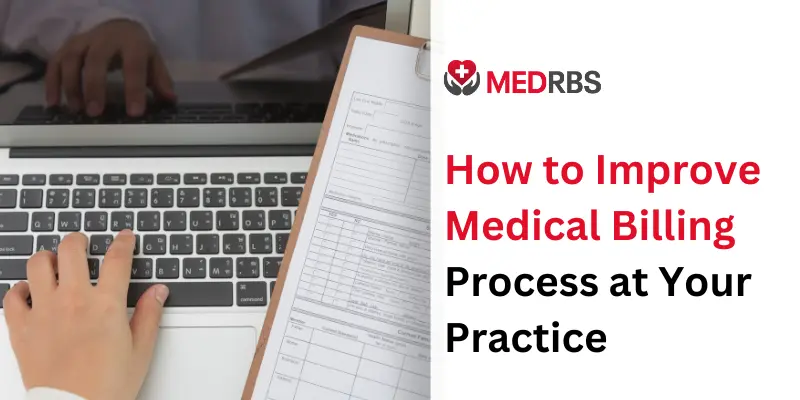Working with rejected insurance claims is a normal part of running a healthcare practice. Even after taking precautions, doctors sometimes face situations where claims get denied. This can be frustrating and cause money problems. In these cases, it’s crucial to know the right steps for dealing with denials effectively. Whether you’ve handled denials before or this is new, reviewing best practices can help resolve rejected claims smoothly. Here, we’ve shared top strategies on how to handle denials in medical billing.
What Is Denial in Medical Billing?
Healthcare claims can be denied by insurance companies. They may refuse to pay for medical services or treatments. There are many reasons why this happens. Some claims have missing or incorrect details. Sometimes there are coding mistakes or no approval. Claims can be fully denied, when all services are rejected. Or only part of the services is denied. This is called a partial denial.
Why Is Handling Claim Denials Important?
When insurance companies deny claims, it can hurt a doctor’s office money. Claims that are denied mean lost money. It also takes time and works to appeal denied claims. This can make it hard for office staff. But, by dealing with denied claims right away, you can do these things:
- Get Paid Faster: Quick claim submission means fewer denials. This gets you paid sooner, helping your finances stay strong.
- Reduce Administrative Burden: Submitting claims correctly the first time reduces denial workload. You won’t need to appeal or rework as much.
- Enhance Patient Satisfaction: Efficient, accurate claims mean patients don’t face surprise bills. They’ll be satisfied with smooth billing.
Common Causes of Claim Denials in Medical Billing
Understanding the most common reasons behind claim denials is an essential step toward preventing them. Here’s a breakdown of some frequent offenders:
- Coding Errors: Codes for treatments or sicknesses could be missing or wrong. This can stop claims from being paid.
- Missing or Inaccurate Information: Patient details, insurance info, or what was done might not be filled out correctly or fully. This makes claims get denied.
- Lack of Prior Authorization: Some procedures require permission from the insurance company before they’ll pay for them.
- Missing or Incorrect Documentation: If medical records don’t show why treatment was needed, claims may get denied. Proper notes are key.
- Non-Covered Services: Procedures that insurance doesn’t pay for, like cosmetic ones, are denied.
- Exceed Benefits Limits: Claims are denied if the treatment exceeds yearly or lifetime coverage amounts for the patient.
5 Strategies for Handling Denials in Medical Billing
Now that you’ve identified the denial culprits, here are some valuable strategies to combat them and ensure smoother claim processing:
1. Invest in Accurate Coding and Billing:
- Stay Up-to-Date: Medical codes change frequently. Make sure your team knows the latest rules and updates.
- Double-Check Everything: Review coding carefully before submitting. Check for mistakes or wrong entries.
- Utilize Technology: Use medical billing software. It checks codes and warns about errors. This helps follow the rules.
2. Prior Authorization is Key:
- Identify Services Requiring Authorization: Learn what services your insurance company requires prior authorization for. This helps avoid issues later.
- Submit Requests Promptly: Don’t wait to ask for authorization. Delays can stop patient care or lead to denials.
- Maintain Clear Documentation: Make sure your authorization requests have clear documentation. Include all details justifying why it’s medically needed.
3. Ensure Impeccable Documentation:
- Keep Detailed Patient Notes: Write down everything about seeing the patient. This includes why you did each test or treatment.
- Use Simple Words: In your notes, use words that are easy to understand. Don’t use shortcuts or special words that could be misunderstood.
- Match Codes to Notes: The codes you use on bills should match what is written in the notes. The codes should show the same problems and treatments.
4. Conduct Regular Audits and Stay Compliant:
- Schedule Internal Audits: Plan regular reviews of your billing methods. Spot any repeat mistakes or ways to improve.
- Stay Informed of Payor Policies: Actively learn of changes to rules or claim instructions from who pays you. This prevents problems.
- Communicate Effectively: Keep talking openly with payors. Address billing issues right away when they happen.
Also Read: What Clearinghouse in Medical Billing and Its Role During Claim Submission?
5. Leverage Denial Management Tools:
- Consider Outsourcing: Think about getting outside help from experts who can handle appeals for denied claims properly. They know how to do this task smoothly.
- Utilize Denial Management Software: Use a computer program that looks at denied claims and finds patterns. This can show you how to fix things.
- Track and Analyze Denials: Watch your denied claims closely. See why they get denied. This helps you understand how to submit claims better.
How to Handle Denials in Medical Billing
Even with the best preventive measures, some claim denials are inevitable. However, don’t despair! You have the right to appeal a denial if you believe it’s incorrect. Here’s a breakdown of the steps involved in a successful appeal:
1. Understand the Denial Reason:
- Review the Explanation of Benefits (EOB): This paper from your insurance company tells you why they denied your claim. Read it carefully to know the exact problem.
- Contact the Payor: If the Summary of Benefits is confusing, contact the customer service team at your insurance company. They can explain why your claim was denied in simpler terms.
2. Gather Supporting Documentation:
- Assemble Evidence: Get together any papers that help prove your case. This includes detailed medical records, reports from surgeries, or requests for approval before treatment.
- Focus on Medical Necessity: Clearly show why the denied service was medically necessary. Use relevant papers and notes from doctors to explain the need.
3. Craft a Compelling Appeal Letter:
- Time is of the Essence: Insurance companies set deadlines for appealing. Act fast.
- Clearly State the Denial and Reason for Appeal: Name the denied claim. Explain why the denial was wrong.
- Maintain a Professional Tone: Be professional in your appeal letter. Avoid accusing language.
- Include Supporting Documentation: Attach papers that back up why payment should be made.
4. Follow Up and Maintain Persistence:
- Keep Records: Note down when you sent your appeal. Also, write down any response from the insurance company.
- Follow Up Politely: If you don’t hear back in a fair amount of time, kindly ask the insurance company for an update.
- Ask for Outside Review: If your appeal is denied, you may be able to request an independent third party to review your case.
5. Additional Tips for a Winning Appeal:
- Stay Organized: Use a simple system to keep track of claims the insurance company denied. Also, organize the paperwork for appeals.
- Stay Informed: Know the state and federal rules about billing for health care services. Learn the laws for appealing denials.
- Consider Professional Help: Get help from an expert medical billing and coding company. They can assist with complicated denials or repeated issues.
How to Minimize Denials in the First Place
An effective appeals process is essential, but it’s preferable to avoid denials right from the beginning. Here are additional strategies to prevent denials from the outset:
- Invest in Staff Training: Give your billing staff regular training. Teach them the right way to code. Show them the latest rules for sending claims.
- Patient Eligibility Verification: Before giving care, check if the patient’s insurance covers it. See if they are eligible. This stops problems later.
- Clear Communication with Patients: Tell patients upfront about costs they may pay themselves. Tell them if you need approval first.
- Regular Communication with Payors: Talk to insurance companies often. Learn if their rules or codes change.
- Utilize Electronic Claims Submission: Send claims electronically. It reduces mistakes. Claims are processed faster.
Conclusion:
Knowing why claims get denied can help you stop denials. Putting fixes in place is smart. Learning how to appeal is key too. Doing these things cuts claim denials at your office. This is good. It means claims get paid faster and money flows better. Your practice runs smoother when you work on denials. Taking action on denials plus knowing how to manage them well pays off. You get claims processed easily and cash comes in steadily. Your office gains when you cut denials.






